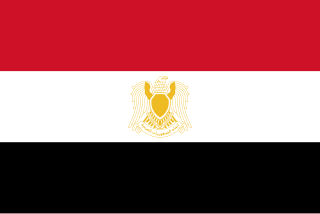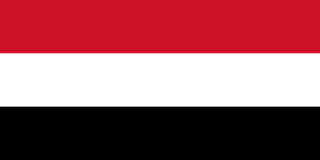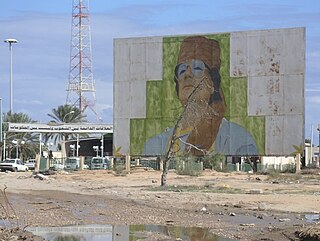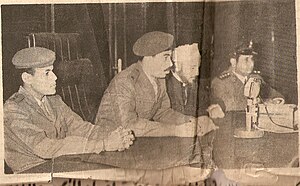
Muammar Muhammad Abu Minyar al-Gaddafi was a Libyan revolutionary, politician and political theorist who ruled Libya from 1969 until his assassination by rebel forces in 2011. He came to power through a military coup, first becoming Revolutionary Chairman of the Libyan Arab Republic from 1969 to 1977 and then the 'Brotherly Leader' of the Great Socialist People's Libyan Arab Jamahiriya from 1977 to 2011. Initially ideologically committed to Arab nationalism and Nasserism, Gaddafi later ruled according to his own Third International Theory.

Idris was King of Libya from 24 December 1951 until his ouster in the 1 September 1969 coup d'état. He ruled over the United Kingdom of Libya from 1951 to 1963, after which the country became known as simply the Kingdom of Libya. Idris had served as Emir of Cyrenaica and Tripolitania from the 1920s until 1951. He was the chief of the Muslim Senussi Order.

The Federation of Arab Republics was an unsuccessful attempt by Muammar Gaddafi to merge Libya, Egypt and Syria in order to create a unified Arab state. Although approved by a referendum in each country on 1 September 1971, the three countries disagreed on the specific terms of the merger. The federation lasted from 1 January 1972 to 19 November 1977.

Muammar Gaddafi became the de facto leader of Libya on 1 September 1969 after leading a group of young Libyan Army officers against King Idris I in a bloodless coup d'état. After the king had fled the country, the Revolutionary Command Council (RCC) headed by Gaddafi abolished the monarchy and the old constitution and established the Libyan Arab Republic, with the motto "freedom, socialism and unity". The name of Libya was changed several times during Gaddafi's tenure as leader. From 1969 to 1977, the name was the Libyan Arab Republic. In 1977, the name was changed to Socialist People's Libyan Arab Jamahiriya. Jamahiriya was a term coined by Gaddafi, usually translated as "state of the masses". The country was renamed again in 1986 as the Great Socialist People's Libyan Arab Jamahiriya, after the United States bombing that year.

Abdessalam Jalloud is a Libyan former politician and military officer who served as the Prime Minister of Libya from 16 July 1972 to 2 March 1977, under the government of Muammar Gaddafi. He was also Minister of Treasury from 1970 until 1972.

The Revolutionary Command Council was the twelve-person governing body that ruled the Libyan Arab Republic after the 1969 Libyan coup d'état by the Free Officers Movement, which overthrew the Senussi monarchy of King Idris I. The council's chairman was Muammar Gaddafi, who had the most influence and served as Libya's de facto head of state as Revolutionary Chairman of the Libyan Arab Republic and commander-in-chief of the armed forces. It was ideologically Arab nationalist, republican, anti-imperialist and pan-Arabist.

Umar Abdullah el-Muhayshi, also transliterated as Omar al-Meheshi, was a Libyan army officer and a member of the Libyan Revolutionary Command Council (RCC) that ruled Libya after the 1969 Libyan coup d'état.
Massoud Abdelhafid is a Libyan retired army general during the government of Muammar Gaddafi. He held various positions in government following the 1969 coup d'etat of Muammar Gaddafi, including Commander of Military Security, Governor of Fezzan and Head of Security in Major Cities. He was a key figure in Libya's relations with neighbouring Chad and Sudan. Massoud Abdelhafid was a senior commander in the Libyan Army during the Chadian–Libyan conflict. Known for his leadership of Libyan-backed insurrections and wars in Chad, he was referred to as "Mr. Chad". He married to a sister of al-Gaddafi and to a niece of Goukouni Oueddei.
The Qadhadhfa is one of the Arab Ashraf tribes in Libya, living in the Sirte District in present-day northwestern Libya. They are traditionally counted amongst the country's Ashraf tribes, and during the Gaddafi regime were regarded as one of the greatest and most powerful tribes in the whole country. They are now mostly centered at Qasr Abu Hadi, Sirte.

The Brotherly Leader and Guide of the Revolution of the Great Socialist People's Libyan Arab Jamahiriya was a title held by former Libyan leader Muammar Gaddafi, who claimed to be merely a symbolic figurehead of the country's official governance structure. However, critics long described him as a dictator, referring to his position as the de facto former political office, despite the Libyan state's denial of him holding any power.

The 1969 Libyan revolution, also known as the al-Fateh Revolution or 1 September Revolution, was a coup d'état and revolution carried out by the Free Officers Movement, a group of Arab nationalist and Nasserist officers in the Libyan Army, which overthrew the Senussi monarchy of King Idris I and resulted in the formation of the Libyan Arab Republic. The Free Officers Movement was led by Colonel Muammar Gaddafi.
Having taken power in a coup three months earlier, Muammar Gaddafi faced a mutiny by army and interior ministers Moussa Ahmed and Adam Hawaz, both from the eastern Barqa region. The pair were routed and imprisoned in the first of Gaddafi's many survivals.

The 1993 coup d'état was a failed military coup initiated by the Warfalla senior military officers against Libyan leader Muammar el-Qaddafi on 22 October 1993. The coup was led by Khalifa Haftar, a leading senior officer in the Libyan Army who later defected during the coup. The result was the execution of many senior officers and the installment of loyal members.

Al-Khweldi Muhammad Salih Abdullah El-Hamedi, also transliterated as Khuwailidi al-Humaidi, was a Libyan Major General under Muammar Gaddafi, founding member of the Libyan Revolutionary Command Council, and the first Secretary General of the Libyan Popular National Movement. He was part of Gaddafi's inner circle.

Mustafa al-Kharoubi, also transliterated as Kharubi, was a Libyan general and politician under Muammar Gaddafi. He was part of Gaddafi's inner circle.
Abdel Moniem al-Taher al-Houni, also transliterated as Abdul Munim el-Huni, is a Libyan military officer, diplomat, and politician. He was one of the original twelve members of the Libyan Revolutionary Command Council and briefly served as Minister of Foreign Affairs from 1974 to 1975.

Mohammed Emhamed Awad Najm was a Libyan military officer and political figure. He was one of the original twelve members of the Libyan Revolutionary Command Council (RCC) and also served as the Libyan Foreign Minister.
The personal life of Muammar Gaddafi was complicated and the subject of significant international interest.

Muammar Gaddafi dominated Libya's politics for four decades and was the subject of a pervasive cult of personality. He was decorated with various awards and praised for his anti-imperialist stance, support for Arab—and then African—unity, as well as for significant development to the country following the discovery of oil reserves. Conversely, many Libyans strongly opposed Gaddafi's social and economic reforms; he was posthumously accused of various human rights violations. He was condemned by many as a dictator whose authoritarian administration systematically violated human rights and financed global terrorism in the region and abroad.

The Free Officers movement was a group of Arab nationalist and Nasserist officers in the Libyan Army that planned and carried out the 1969 Libyan coup d'état, which overthrew the Senussi monarchy of King Idris I, ending the Libyan monarchy. It was led by a twelve-member cabinet known as the Revolutionary Command Council, whose chairman was Muammar Gaddafi, which came to govern the Libyan Arab Republic.














